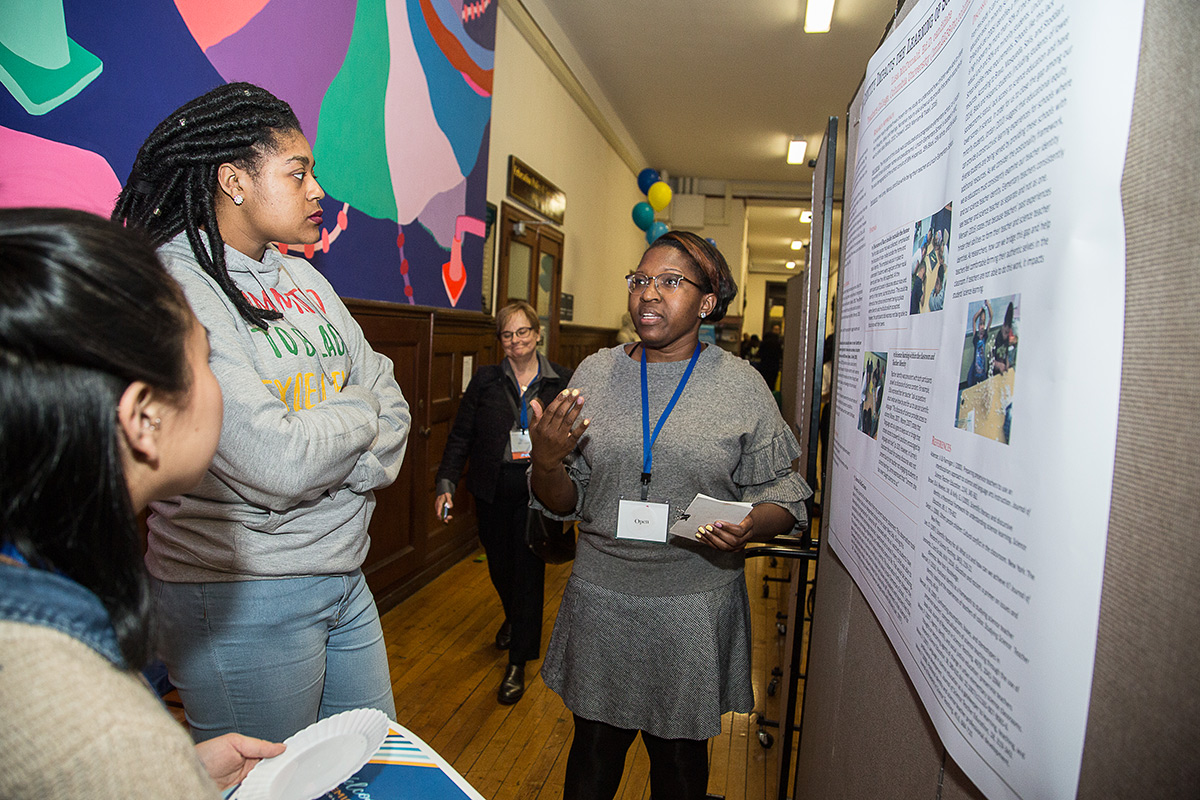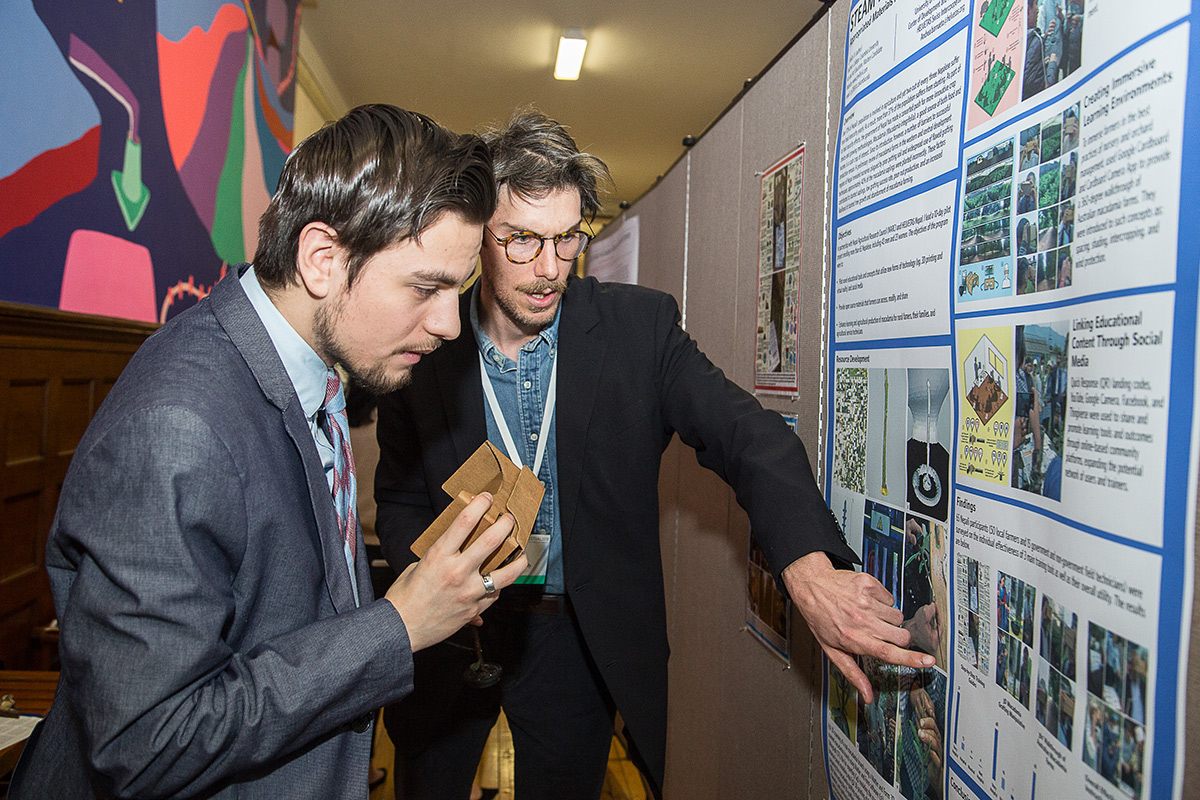BEST IN SHOW Doctoral student Lisa McDonald (right) won the student research poster competition.

BEST IN SHOW Doctoral student Lisa McDonald (right) won the student research poster competition.
When TC Elementary Education student teacher Lisa M. McDonald set out to write the paper she has since titled “How Teacher Identity Impacts the Learning of Science for Elementary Students,” she began with two questions:
- How does a teacher’s identity impact a marginalized student’s conception of learning science?
- How does the role of racial identity of elementary students impact their science learning?
In April, McDonald’s research took first prize at the student research poster session at TC’s 2018 Academic Festival, winning her the Innovation Scholarship for Student Research (a tuition credit). The People’s Choice award went to C.J. Reilly III, a master’s degree student in Art & Art Education, for his work on “STEAM-Powered Food Security.”
Conducting qualitative research at the Lincoln School, a largely-minority, public elementary school in Washington Heights in Manhattan, McDonald – who credits Felicia Mensah, Professor of Science Education, for inspiration -- interviewed two students and observed students’ discussions and activities in science class. Among her findings:
- Teacher identity and the quality of discourse of science content was important to the students. Referencing work by Mensah, McDonald writes that a higher quality of science discourse, including using scientifically accurate language in classroom discussions increases students’ interest in – and identification with – science.
- A teacher’s self-identity as a confident science teacher – as well as a richly appointed classroom – can determine how well a child does in science class.
Discussing her research after the poster session, McDonald noted “how much of the development of students’ identities is our responsibility as teachers.”
CROWD FAVORITE C.J. Reilly, who will receive his master's degree Art & Art Education in May, received the People's Choice Award for his poster on "STEAM-Powered Food Security.

CROWD FAVORITE C.J. Reilly, who will receive his master's degree Art & Art Education in May, received the People's Choice Award for his poster on "STEAM-Powered Food Security.
Reilly, who is graduating in May, has developed educational tools for low-literacy, marginalized farmers in Nepal. Over 70 percent of Nepal’s population is involved in agriculture and yet each year two out of every three Nepalese experiences food insecurity. As a result, more than 37 percent of the population suffers from stunting. As part of its food security efforts, the government of Nepal has made a concerted push for more innovative crop choices and growing methodologies. Macadamia nuts (Macadamia integrifolia), are a good source of both food and income, is a cash crop of interest. Reilly’s work looked at how new technologies (3-D printing and virtual reality) could create more effective educational materials for fledgling macadamia farmers and improve agricultural yields.
Prior to attending TC, both in the U.S. Peace Corps and working with HELVETAS Nepal (Switzerland’s International Development Agency), Reilly developed, designed and supported new training solutions to solve complex problems in fruit and nut production, specifically nursery and grafting management in Nepal. Because the only way to ensure the quality of the fruit and the health of the tree is through best practices in nursery and grafting management, it was critical that Nepali farmers and field technicians embrace these techniques to sell and compete on the world market. At TC, working in the Myers Studio, Reilly used 3-D printing to create tree models on which farmers could practice the grafting techniques. The 3-D tree models were created exactly to scale, using scanned specifications of actual trees.
“TC’s maker space and such tools as virtual reality, 3-D printing and scanning allowed me to look at how I could design educational tools to help streamline the learning process for Nepali farmers and their communities,” Reilly said.
Other poster session entries included:
“Proving them wrong: Resistance and accommodation within an undocumented YPAR (Youth Participation Action Research) collective,” Katia Chapman’s analysis of the structures and barriers encountered by seven undocumented immigrant students in upstate New York. Chapman, will her M.A. in Sociology & Education in May.
Social-Emotional Abilities for Students with Autism Spectrum Disorder: A National Survey of Special Education Teachers in China,” by Yanru Chen, a Ph.D candidate in I.D.-Autism Program in the Department of Health & Behavior Studies. Chen found that emotional regulation is the most important skill to focus on in working with children on the autism spectrum.
“How learning from a peer model who overcame difficulties impacted novice learners’ self-learning, and transfer,” by Ahram Choi, an Ed.D candidate in the Instructional Technology and Media program in the Department of Math, Science & Technology. Choi detailed the outcomes from a study of 90 Korean high school students. Assigned a topic about which they did not have prior knowledge, the students exposed to a “coping model” containing errors demonstrated more mastery than students presented with an error free model. – Steve Giegerich and Patricia Lamiell
Read more about Academic Festival 2018:
Distinguished, Accomplished and Diverse: TC’s 2018 Alumni Honorees
Student Research Poster Competition
“X” Marks the Future: Academic Festival 2018 spotlights the world at a crossroads